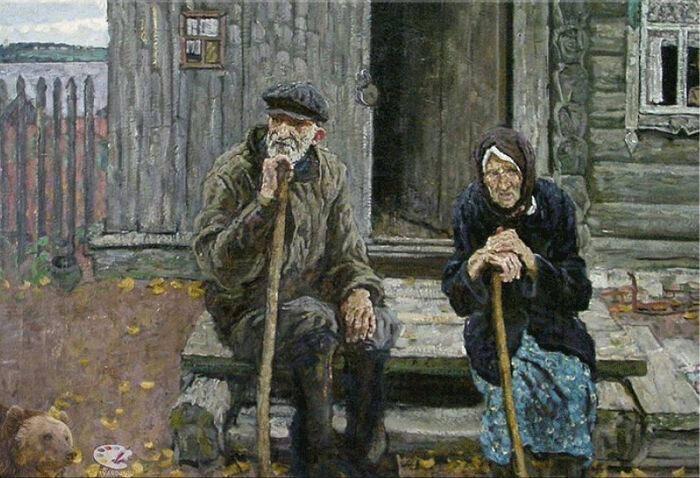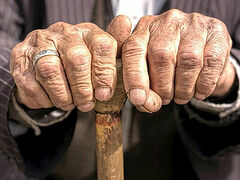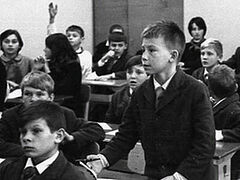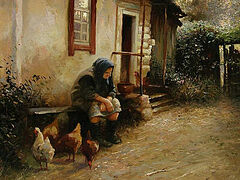On my way there, I didn’t go straight to the yard of my classmate, but I first paid a visit to her father’s, Dyad’ka1 Mikhail Ivanovich. He lived there with his second wife Marusya, who became a mother to his three children, still very young at the time of their mother’s death.
He screened movies from “time immemorial,” while Marusya sat in the auditorium next to the door watching the screen and checking the tickets of the moviegoers, thus combining business with pleasure.
A big white screen stretched from wall to wall in place of the former iconostasis and even the “deacon's doors” still framed it on either side
A big white screen stretched from wall to wall in place of the former iconostasis and even the “deacon's doors” still framed it on either side. Nowadays, any busybody could get on stage and into the “dressing rooms” (formerly the subdeacon’s rooms). One of the dressing rooms was also used as the club director’s office.
The “cinema man” was always gloomy and laconic, but his wife was talkative and sweet. My memory brings back the following picture: we children rush around the club waiting for his short, stocky figure in the ubiquitous brown corduroy jacket and a cap pulled down over his eyes to emerge from the corner of the shop. Then, slouching a little, he would wander forth to his private separate entrance on the west side of the club that led straight to the movie booth high up. It seems before, the bell tower had been there...
On his way there, he would stop by the bulletin board (decorated with big wooden letters "KINO" at the top) and attach a colorful gouache poster with a handwritten announcement about the next day’s screening and saying something like:
“Essenia,” an Indian art film, for adults. For children: “My friend, Kolka”. Movie times... Prices... (fifteen and five kopecks, respectively).
Later, silently and intensely looking under his feet and paying absolutely no attention to us, happy and delighted that the "movie" was actually in the works despite our fears (what if doesn’t have anything for us?), he walked towards his door like the master of all things.
He and his wife often went to the club together, and despite my minimal life experience, I was somehow firmly convinced that they got along well and lived amicably with each other.
So, I first entered Dyad’ko Misha’s yard, because my main interest was actually to see him: I really wanted to have a detailed conversation with him about the church, that is, the club, where he had spent most of his life and perhaps knew something unusual about it. After all, he was currently one of the oldest residents of Ivan’kovo, so who else would know if not him?
A shady, green courtyard, completely overgrown with soft curly knotgrass, the gentle spring sun shining brightly over it. He and his wife are sitting side by side on the bench under the wall of their hut, their faces turned towards the caressing rays of the sun. Both of them are... blind...
Of course, I had heard something about it, but I didn’t expect that it to be so literally true that they had completely lost their eyesight and their eyes were as if covered by a white film... Overcoming the confusion of the first encounter, I came up close to greet them and introduce myself. It turned out they remembered me very well and were very happy to meet me. They were both talkative and friendly; he seemed to be even more so than her. Or was it in contrast to my childhood memories?
We somehow quickly and easily began to talk about the former church, when they suddenly encouraged me to explore the topic further, talking excitedly about it and interrupting each other.
We must reopen our church again, it is an absolute must! There’s no life for a man without a church!
“We must reopen our church, we just have to! There's no life for a man without a church! Almost all of our young people are lying dead in the cemetery, not to mention our older folks. There are even multigenerational graves: a father and all his sons, side by side... It’s all because of vodka. Even women aren't too far behind these days, drinking just as much as the men. They kill each other—husbands killing their wives, sons killing their fathers...”
“The collective farm is completely bankrupt, though it used to be financially successful... What a village we had before! Especially, when there weren’t the collective farms yet. Our church was the most beautiful one in the whole area, and for a reason, too. What a bell hung there! When it rang on Pascha you could hear it in Kiev! And it’s three hundred kilometers to Kiev, by the way. But what are they doing now in the club?!... They haven’t shown movies for a long time, there’s nothing left but television there.”
“All in all, the young people have only one activity left there: they shuttle back and forth between the store and the club with bottles—to get drunk at the pool table. That’s what they do practically all night long. The store is open at night specifically for them—they call it a “bar” at night. But this store’s stone structure was built before the revolution, along with the parochial school. Those preserved the best were built before the revolution—so there’s that! The descendants of the former local gentry recently came to the village—they wanted to see their ‘ancestral home,’ and they found it in its original form, we can say, as it was a hundred years ago. That building inside the school garden, housing today’s elementary school, the so-called “little school,” was their family home. And today’s “big” school was then a parochial school. Everything that belonged to the collective farm has turned to ashes, almost nothing is left of it, but these buildings still serve faithfully—and that’s a shocker!..”
“A point-to-point path from the ‘bar’ to the club is now paved over, but it goes right over the graves of priests, right next to the walls of the former church... So, they make their runs on the graves of the priests... But who remembers or thinks about this today? Of course, they were told about it, but apparently in vain. About ten years ago, a festive swing was erected for the young people on Trinity Day, in accordance with an old custom. They didn’t put it up near the pond, or in the park like in the old days, but they dared to put it next to the club, in the burial yard, right above the old graves. And so, a young girl aged sixteen was fatally struck in the temple by the wooden swing. I immediately thought that it was no accident. And this girl’s mother, a librarian, was practically sitting next to her at the time—because the library had just been moved to the right side chapel of the former church. For decades before that, it had been housed in the wooden parish house until it fell apart and finally collapsed. Since that accident, this woman has been, as the villagers say, ‘spaced out’, silent and pensive. Yes... So much for the ‘apples of paradise...’”
As for the “apples of paradise,” he was probably referring to the unknown species of fruit trees behind the church that produced an abundance of unusual apples on long, thin stalks – they were pink, juicy and crunchy, with a peculiar taste. For some reason, none of the locals had such apples.
The former church house, with its large windows and high twin porches on either side, housed besides the library and post office also the village clinic. When that building became obsolete and fell apart, no one came to their senses after the swing accident and a new clinic was erected above the cemetery, especially since the church fence was completely gone by then, leaving the sacred space open to all the winds.
If they don’t reopen the church, the village will die out completely. But all you have to do is simply remove those wooden panels from the walls—the saints are painted underneath! All the saints are painted there!
“If they don't reopen the church, the village will die out,” Dyad’ko Misha continued. “You're more educated, and you live in Moscow, so why don’t you write somewhere! After all, all you have to do is remove the wooden panels from the walls—and behind them are all the saints! All the saints are painted there! And they see! They see with their eyes!”
“Yes,” his wife nodded her head. “If you go to the club, everyone there is crazy! But, when you step inside a church, you feel quiet...”
The elderly couple decided to treat me to something tasty, and so we went inside their house. It was almost dark there because of the dense shade of the overgrown lilac and jasmine bushes outside; and the sun was already beginning to set behind the garden trees. The two of them searched blindly for something in the dark, by the stove and in the cupboard, while I sat there waiting for the owners to turn on the light. Only later did I realize that they didn’t need any light at all and they had probably discarded the idea of having it long time ago.
The wall-mounted radio was loudly broadcasting something in the adjacent room. Larka came by a couple of times and called me to come over, seemingly offended. She was having guests at a laden table, but I was reluctant to leave this darkened room; I kept lingering inside this house and excusing myself.
And that’s how it remained in my memory: the sun, the courtyard, completely overgrown with fresh, bright knotgrass, and they, so old, sitting side by side, close to each other, exposing their faces to the warmth of the spring sun. Their faces looked so child-like and endearing...
Did the people of Ivan’kovo notice a special kind of divine admonition in the fact that these two elderly people, a man and his wife, who were screening movies in a former church for decades, looking at the screen in front of the altar and helping others to do the same, suddenly became blind together, at the same time? And that their eyes were covered with the same whitish film, like the screen that hid the altar, or like those film strips they were spinning?..
We can believe that the old couple did realize what happened to them and repented on their own, because they spoke so fervently about the former church, that it had to be opened, and that there was no life without it... Did the their fellow villagers realize it? I am not sure.
Recently, Valentina came to visit again.
“Listen,” she said to me, “you probably shouldn’t give Dyad’ka Misha anything special the next time you’re there. Larka is spreading all kinds of nonsense about you in the village. She says that you are acting really odd, that you got religion, or maybe you have become a Shtunda (Southern Russian Evangelical Christians are called this way in Ukraine). Sure, you don’t see men or drink vodka... And, she says, a few years ago you gave her father some strange-sounding CDs with some bizarre hymns, as if they weren’t sung in Russian...”
To my former classmate, who has a degree in cultural education, the word of the Gospel sounded completely incomprehensible and “non-Russian”
I was thinking: what could it be, what did I give him then? I tried to remember. The songs... the “Russian Cross”, the recitation of a poem by Svetlana Kopylova, read by Ekaterina Krasnobaeva... Oh, this is what it was: “The Four Gospels” recorded by Sretensky Monastery! And they don't even read it in Church Slavonic, they practically use the modern Russian, known to almost everyone in Ukraine. As for my peers, they know it perfectly. As for my classmate, who graduated from the university with the degree in cultural education, who had worked all her life in the “field of education”, the words of the Gospel were completely incomprehensible and “non-Russian…”
Truly, He came so that the blind could see and seeing men become blind...2
As time went on, the younger and more enterprising people kicked my friend out of her “fiefdom club”—a fact that so upset and depressed her that she tried to cure herself using an age-old, folk remedy. Most likely, the Lord simply took pity on her and kept her away from doing some evil deed in the holy place...
The gaze of the Archangel Michael from behind the logs
The office of the collective farm in Ivan’kovo was also built from logs taken from the church when in the 1950s, the interior partitions and the bell tower were dismantled and the church was turned into a club. But after the collapse of the collective farm, its office became redundant and in the era of mass privatization, Dyad’ka Misha’s eldest son bought it to use as his private residence. But suddenly, the eyes, faces, and the whole images of saints appeared on its walls, which have been left without a fresh coat of whitewash for some time... Could it be rebuilt as a residential building? For one reason or another, it was left standing empty and dilapidated, and the whole area, surrounded by a scraggy garden, finally turned into a wasteland. A former collective farm kindergarten ended up being seized in the “halo of shame” of this wasteland, because as it turned out, it was also built from the church logs.
One day I visited Ivan’kovo with my younger sister Raisa. We stepped inside what was formerly the collective farm office
(unlocked for a long time by then) to have a look at the walls. And, right from the threshold, we were greeted... with the Archangel Michael’s gaze!
He was looking at us through the hazy shreds of the ancient whitewash. We stood there, looking at him in silence. Then Raya decisively turned towards me and said in a firm, unobjectionable voice:
“We must return here tonight and somehow carve it out with the saw and carry him away. He shouldn’t stay here, as it will crumble down completely and this whole thing will be in ruins! And the icons will be gone, and that's a sin!”
“But how about the fact that it belongs to Larka's brother, and he lives in Chernigov. How can we cut it out? With what, the saw? Look at these logs—it’s probably oak, and stronger than iron.”
We left almost in tears.
A few years passed, and I recently received the latest news from Ivan’kovo. Larka, who apparently received the property rights to this farm office as a gift from her brother, disassembled it and took the logs to her yard with the intention of using them for heating. Her neighbor Yura, who was helping with the transportation, saw that the logs were suddenly covered with frighteningly precise images of the saints. He began to beg them to give him the logs instead of wasting them as firewood. But Larka didn’t even want to hear it! What kind of nonsense are you talking about here, what holy images? I need firewood to heat my house in winter. The man grew indignant and told the story to the other villagers.
Some of the logs crumbled down in their hands, but the ones with the saints on them, they even resonated! As if they were sawn and dried only recently
“Some of the logs were all rotten and crumbled in our hands, but the ones with the saints on them, they even resonated! As if they’d just been sawn and dried. Good as new,” he said with astonismment. “Of course, they are perfect for heating the house...”
The neighbor Antonina supported Yura and also went to ask for the logs. Other villagers joined them. Remarkably, among these people was the great-grandson of a man who had thrown down the cross at the first closing of the church. Remarkable, but not surprising, since each person is bestowed with free will and creates his or her own destiny. After all, destiny is not something that is predetermined beforehand, but it is the fruit brought forth as a result of man’s daily actions, the ones that the soul will bring to the Great and Last Judgment at the end of its earthly sojourn. Their “lot”—the judgment of God—is the response of Higher Justice to the deeds committed by man. Simply put, what each of us has today is the result of our life yesterday, but what we have tomorrow will depend on our deeds today.
As for the delegations sent to save the logs, their efforts were all in vain... Larka stubbornly refused, unwilling to hear any dissuasion from her neighbors. A scandal ensued. As a result, my former classmate finally got mad and sent the villagers “to the middle of nowhere” insisting that these logs were her property and she was free to do with them as she pleases, and she was a law unto herself.
Although these notes have were written quite a long time ago, this is how the recent history of the Protection Church in the village of Ivan’kovo ends, at least, for now...





